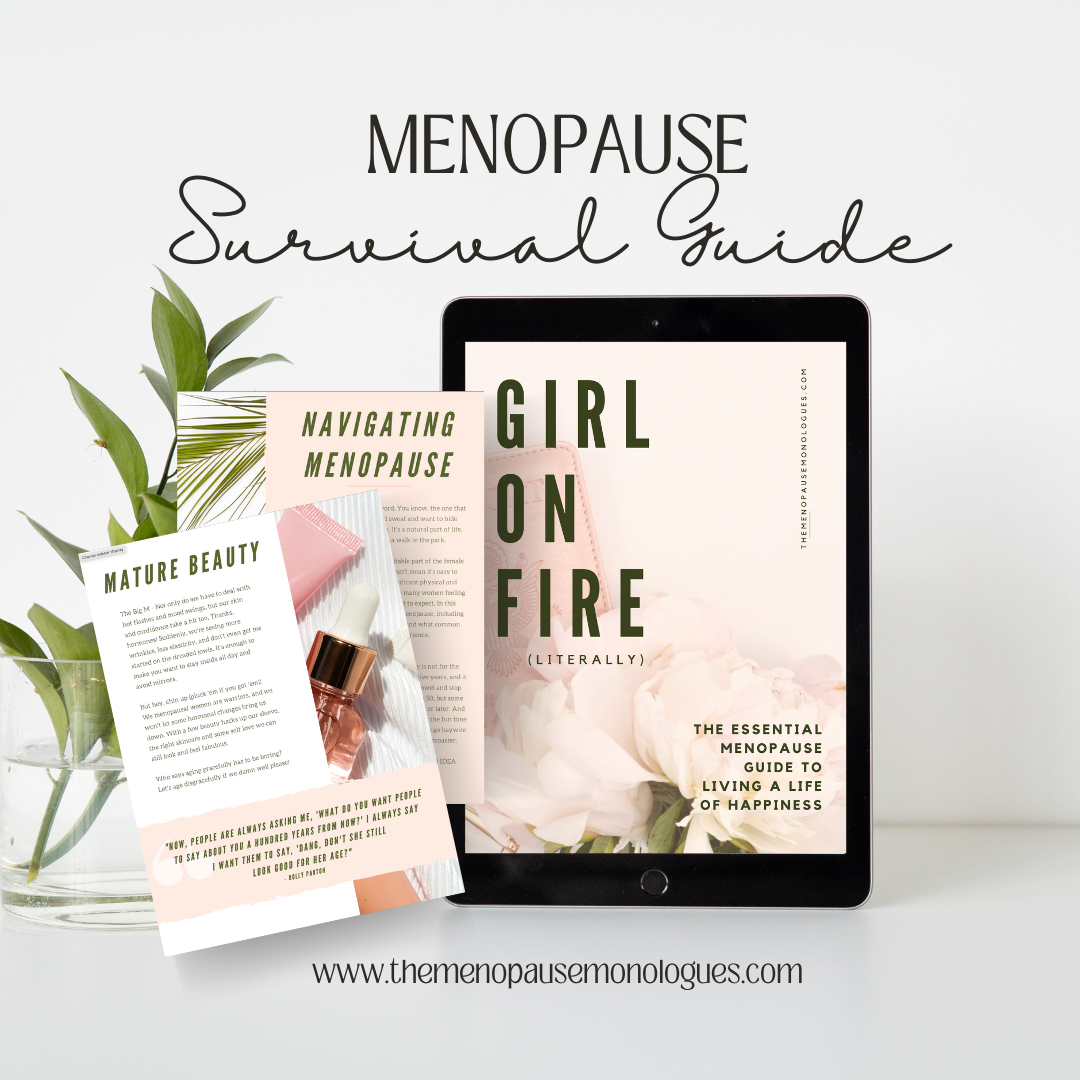Managing Anxiety & Mood Swings During Menopause: Tips for Mental Health Support
Understanding Anxiety and Mood Swings During Menopause
Over a glass of wine my friend blurted “MENTALpause!!” as we were commiserating over our current state of affairs. She was spot on.
Let's talk about menopause + mental health. AKA our shit ‘storm of new norm’ (we should make swag). We all know that menopause comes with no short amount of physical symptoms like hot flashes, night sweats, weight gain and insomnia, but did you know that it can also fuck with your mind? Yup, menopause can turn you into an emotional rollercoaster with mood swings, anxiety, and depression. Good news? You're not alone in this crazy ride, it just feels like it. Let's break it down and figure out how to navigate this new chapter in life together.
The Connection Between Menopause and Mental Health
It’s time to get real about perimenopause and menopause.
It's like a hormonal hurricane blew through your brain and left you with all sorts of mental mayhem. Mood swings, irritability, and rage that make PMS look like a walk in the park? Check. Anxiety, panic attacks, and depression that make you want to scream into a pillow? Check, check, and check. To be a little more “science’y”: Your hormones start doing the cha-cha, with estrogen and progesterone levels bouncing around like a hyperactive toddler on a trampoline. And let's not forget about the star of the show, estrogen, which loves to mess with your mood and leave you feeling like a cranky toddler yourself. As if that wasn't enough, the changes in neurotransmitters like serotonin can add insult to injury, making you even more prone to mood swings and irritability.
Common Emotional Symptoms
But wait, there's more! The hormonal changes can also throw your sleep patterns out of whack, leaving you feeling like a zombie on a bad day. And we all know how much fun it is to deal with stress and anxiety when you're running on fumes. So yeah, good luck with regulating your mood and coping with stress during this wild ride.
Coping Strategies for Menopause-Related Anxiety
Other than a double tall Titos and Soda (extra limes!) how DO we deal with these mental symptoms during menopause?
Let's get one thing straight: feeling a little crazy is par for the course. I mean, I'm not exactly thrilled about the word "crazy," but let's be real, it's a fitting description. You're just hoping nobody else notices that you're walking around with your own personal storm cloud over your head. But don't worry, you're not losing your mind - you're just going through a "tough transition" (cue eye roll). So, talk it out with your squad, your boo, join a support group, or get some professional help. You'll quickly find out that you're not alone in this madness. And let's be honest, nothing beats a good old-fashioned rant session to make you feel better about going a little bonkers
Here are some tips that have helped me navigate MENTALpause:
Lifestyle Changes - Self Care
The ultimate self-care routine for menopause-related mental symptoms. Step 1: Grab a bottle of vodka. Step 2: Get comfy and indulge in some good ol' fashioned "self-love" (if you catch my drift). Step 3: Take a relaxing bath, read a steamy romance novel, and just let your mind unwind. And if you're feeling extra fancy, try out some yoga or meditation to give your brain a much-needed break from all those hormonal shifts. Trust me, a little bit of self-care can go a long way when you're dealing with menopause madness.
Natural Remedies and SupplementsThe "D" and "B" vitamins - not to be confused with your ex or your bestie's shady cousin. Vitamin D is a mood booster that helps prevent depression, while Vitamin B is like a secret weapon against anxiety and brain fog. Sure, you can eat fatty fish and leafy greens 'til the cows come home, but sometimes it's just not enough. That's where supplements come in - your secret weapon against the menopause madness. So, load up on some high-quality vitamin D and B supplements, and take 'em like you mean it. Trust me, your mental health will thank you for it. And hey, if you're feeling really adventurous, try out some other fun supplements like magnesium or evening primrose oil. Who knows, maybe they'll make you feel like a new woman (or at least a slightly less frazzled one).
If you're reading this, chances are you're a woman over 40 who's experiencing the shit show that's menopause. Let's face it, it's NEVER a picnic. Between the hot flashes that make you feel like you're in a sauna, the weight gain that seems to come out of nowhere, the gray hairs that keep popping up, and the low energy that leaves you feeling like a sloth, it can feel like our bodies are betraying us.
But don't worry, my friend, you're not alone on this wild ride. In fact, there are millions of women just like us who are navigating this new stage of life. And that's exactly why I created this ebook – to provide you with the tools and strategies you need to thrive during menopause.
Reduce Stress
3. Check your cortisol at the door. Cortisol is a stress hormone that can exacerbate menopause-related mental symptoms like anxiety and depression. So, how do you lower cortisol? One way is to manage stress through relaxation techniques like deep breathing or mindfulness meditation. You can also reduce cortisol by following a high protein diet. Protein is made up of amino acids, which are essential for the production of hormones, including cortisol. Consuming a diet that is high in protein can help to regulate cortisol production, as well as other stress hormones. Additionally, a high protein diet can help to stabilize blood sugar levels, which can also contribute to lower cortisol levels. Bonus tip: Don’t have that morning coffee on an empty stomach.
Professional Support and Therapy
4. Last but not least, consider talking to your doctor about hormone replacement therapy (HRT). HRT can help regulate your hormone levels and reduce the severity of menopause symptoms, including mental ones. It's not a cure-all, but it can definitely make the ride a little smoother. Another great option is finding a professional you can talk it out with. Our mental health is JUST as important as our physical health.
In conclusion, menopause and mental health can be a real bitch, but you can make it through with a little help from your friends (and maybe some HRT). Remember, it's okay to feel a little crazy during this transition, but it's important to take care of yourself and seek help if you need it. And always remember, you're not alone. There are millions of women going through the same thing, so let's support each other and laugh in the face of menopause, then cry, then laugh again, then rage, then cry… (I know you feel me)
I love hearing from you!
Help spread the support and comment a tip that has helped you navigate this new chapter.
We need an ALL arms hug around our amazing community of Meno Warriors!


